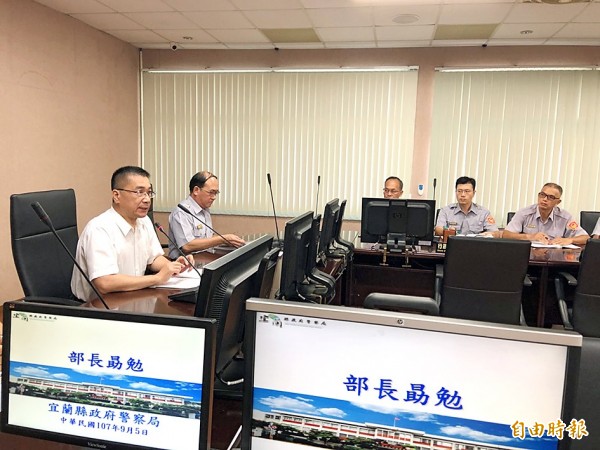《TAIPEI TIMES》 Interior ministry stepping up anti-vote-buying effort

Minister of the Interior Hsu Kuo-yung, left front, talks during a visit to the anti-vote-buying operations room at Yilan County Police Department’s headquarters on Wednesday. Photo: Chen Yu-fu, Taipei Times
By Chen Yu-fu / Staff reporter
The government is stepping up its efforts to prevent organized crime groups and vote-buying from interfering in the results of the Nov. 24 nine-in-one elections, the Ministry of the Interior said.
Minister of the Interior Hsu Kuo-yung (徐國勇) recently ordered police stations at all levels, as well as aviation, airport, seaport and railway police bureaus, to help crack down on criminal organizations attempting to influence the elections, with hundreds of secret operatives deployed to search for evidence of bribery.
It is the first time that the aviation, airport, seaport and railway police have been ordered to assist in preventing election fraud.
As part of the crackdown, a candidate surnamed Lai (賴) running for a township council seat in Changhua County was last week indicted on vote-buying charges after he allegedly gave voters gift boxes of high-quality tea worth NT$1,000 each.
Lai was released on NT$200,000 bail and could face up to three years in prison if found guilty.
Hsu has been monitoring the progress made by the police departments in the six special municipalities in connection with the government’s anti-electoral corruption and anti-violence policies since he took office in July.
He is to wrap up his visits and inspections of city and county police bureaus by the end of this month, including those on outlying islands.
In a recent interview with the Chinese-language Liberty Times (the Taipei Times’ sister newspaper), Hsu said that the crackdown on electoral bribery is to prevent organized crime from interfering in the elections, and the ministry would not allow a repeat of what occurred in Pingtung County in the 1990s when a known gangster, Cheng Tai-chi (鄭太吉), was elected to the Pingtung County Council and became its speaker.
“A thug could not have been elected to the city or county council without having used bribes or threats,” Hsu said.
A bribe offered by a gangster is scarier than one offered by a candidate who is not, and most people would be afraid of rejecting a bribe from gangsters, fearing retaliation if they did not vote for the candidate the gangsters wanted, he said.
Electoral bribery can happen anywhere, which is why the help of aviation, seaport and railway police — some of whom have extensive criminal investigation experience — is needed, he said.
Local police departments do not have to be alone in fighting electoral fraud, he said, adding that police departments can crack down on actions even if they do not occur in their precincts and each division would be rewarded accordingly for their efforts in the crackdown.
The Taipei City Police Department could investigate election bribery cases that occur in New Taipei City, or police in Taipei’s Zhongshan District (中山) can probe cases in Wanhua District (萬華), he said.
People providing tips about electoral corruption would be eligible for a reward of up to NT$5 million (US$162,180) Hsu said.
Half of the reward would be given to the tipster if the tip leads to an indictment; the rest would be given once the election result is declared invalid, he said.
The government is not going to allow gangsters to disrupt and destroy elections in the name of political parties, social groups, foundations or religion, he said.
“A thug could not have been elected to the city or county council without having used bribes or threats,” Hsu said.
A bribe offered by a gangster is scarier than one offered by a candidate who is not, and most people would be afraid of rejecting a bribe from gangsters, fearing retaliation if they did not vote for the candidate the gangsters wanted, he said.
Electoral bribery can happen anywhere, which is why the help of aviation, seaport and railway police — some of whom have extensive criminal investigation experience — is needed, he said.
Local police departments do not have to be alone in fighting electoral fraud, he said, adding that police departments can crack down on actions even if they do not occur in their precincts and each division would be rewarded accordingly for their efforts in the crackdown.
The Taipei City Police Department could investigate election bribery cases that occur in New Taipei City, or police in Taipei’s Zhongshan District (中山) can probe cases in Wanhua District (萬華), he said.
People providing tips about electoral corruption would be eligible for a reward of up to NT$5 million (US$162,180) Hsu said.
Half of the reward would be given to the tipster if the tip leads to an indictment; the rest would be given once the election result is declared invalid, he said.
The government is not going to allow gangsters to disrupt and destroy elections in the name of political parties, social groups, foundations or religion, he said.
新聞來源:TAIPEI TIMES

















